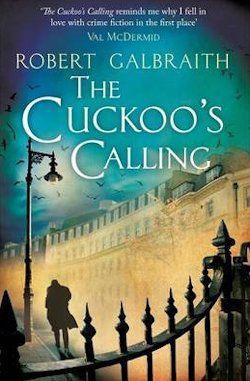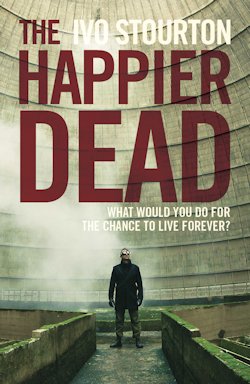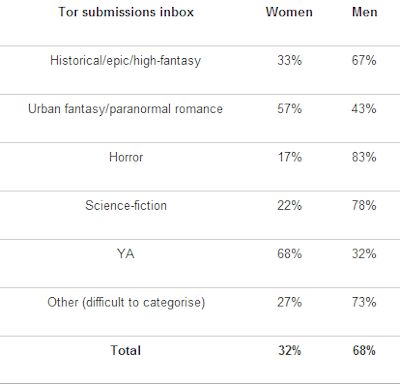Welcome once again to the British Genre Fiction Focus, Tor.com’s regular round-up of book news from the United Kingdom’s thriving speculative fiction industry.
After last week’s summer book announcement blowout, a more serious matter rules the day today: that of the representation of women in genre fiction. To illustrate this, Editorial Director Julie Crisp reported on a survey of submissions to Tor UK, categorising said according to genre and gender. The results were worrying: a fundamental imbalance exists.
Now how do we go about fixing it?
Meanwhile, over the weekend, Harry Potter author J. K. Rowling admitted to being behind The Cuckoo’s Calling, a crime novel—purportedly by ex-military man Robert Galbraith—published just three months ago, and critically acclaimed, if not a great sales success. I don my tinfoil hat to wonder how and why the big secret was revealed.
The Curious Case of J. K. Galbraith
Hot on the heels of the publication and subsequent slating of The Casual Vacancy, The Sunday Times just outed J. K. Rowling as the author of another crime novel. This one, however, was published under a pseudonym: namely Robert Galbraith, a supposed civilian security operative.
This, I think, casts a slightly different light on her self-congratulatory closing comments to The Guardian last September. During an interview with Decca Aitkenhead, Rowling confessed to have considered publishing her first non-Harry Potter novel under a nom de plume, before deciding it was “braver to do it like this.”
Or to have it both ways, eh?
In any case, The Cuckoo’s Calling seems to have been reasonably well received since its release in mid-April. According to the originating article, one critic called it “a scintillating debut,” whilst another praised the author for “his” extensive knowledge of women’s wear. Quite the acclaim.
But being a typically cynical Briton, it behooves me to moot that reviewers make certain allowances for first-time writers. One can only wonder how The Cuckoo’s Calling would have been be received had it had the Harry Potter’s author real name emblazoned on the front cover and such.

Tellingly, given her rise to prominence since the success of The Philosopher’s Stone so long ago, and the attendant problems regarding privacy in the public eye, The Cuckoo’s Calling is a crime novel very much concerned with celebrity:
After losing his leg to a land mine in Afghanistan, Cormoran Strike is barely scraping by as a private investigator. Strike is down to one client, and creditors are calling. He has also just broken up with his longtime girlfriend and is living in his office.
Then John Bristow walks through his door with an amazing story: His sister, the legendary supermodel Lula Landry, known to her friends as the Cuckoo, famously fell to her death a few months earlier. The police ruled it a suicide, but John refuses to believe that. The case plunges Strike into the world of multimillionaire beauties, rock-star boyfriends, and desperate designers, and it introduces him to every variety of pleasure, enticement, seduction, and delusion known to man.
You may think you know detectives, but you’ve never met one quite like Strike. You may think you know about the wealthy and famous, but you’ve never seen them under an investigation like this.
Call me a conspiracy theorist, but I can’t help wondering how word of Rowling’s involvement got out.
I sincerely doubt the author herself played any part in the breaking of this fascinating fakery. Firstly, there’s the fact that she’s already rolling in it—in no need another round of royalties, really—but I’m mostly convinced by Rowling’s reaction:
“I had hoped to keep this secret a little longer because being Robert Galbraith has been such a liberating experience. It has been wonderful to publish without hype or expectation, and pure pleasure to get feedback under a different name.”
That said, the news has undoubtedly done wonders for sales of The Cuckoo’s Calling, which had heretofore sold a grand total of approximately 1500 copies. As of now, however—or rather the time of this writing—it’s Amazon’s bestselling book in the UK and the United States.
More fuel for the fire: the paperback of The Casual Vacancy is published tomorrow, and this reveal is sure to reinvigorate sales of said. Plus the two books share a publisher in Britain, in the shape of Sphere.
Coincidence? We’ll probably never know. But it’s fun to speculate, isn’t it?
Cover Art Corner: The Happier Dead

We spent a lot of last week’s column talking about the books we’ll be reading a year or two or three from now, which was all very well—it’s interesting to see where the genre is headed—albeit pretty pointless, practically. So it’s with pleasure that I introduce you to The Happier Dead, which Solaris plan to publish in February 2014. That’s only seven scant months from today, by the way.
Set in a London of the future, The Happier Dead sees a corrupted city dominated by a rejuvenating spa, the control over which gives Britain unparalleled global power. But the spa’s treatments, available only to those who can afford them, hide dark secrets that are set to unravel.
The author, Ivo Stourton, has published two mainstream novels in recent years—namely The Night Climbers and The Book-Lover’s Tale, both of which sound interesting in synopsis—however The Happier Dead is his first (sort of) genre novel.
Of the text itself, Solaris’ Editor in Chief Jonathan Oliver said:
“Ivo Stourton’s near future crime novel is an intelligent, moving and incredibly entertaining thriller. There are shades of Philip K. Dick and even The Prisoner here, but it’s Ivo’s distinctive voice that makes this such a compelling read.”
Stourton himself is an erstwhile solicitor and occasional playwright. A graduate from Eton, indeed, and the older brother of one half of Totally Tom, a stand-up double act I recall rather enjoying at the Fringe in 2012.
But back to the book! By way of the blurb:
The Great Spa sits on the edge of London, a structure so huge as to be visible from space. The power of Britain on the world stage rests in its monopoly on “The Treatment”, a medical procedure which can transform those rich and powerful enough to obtain a license into a state of permanent physical youth.
The Great Spa is the place where the newly young immortals go to revitalise their aged souls. In this most important and secure of facilities, a murder of one of the guests threatens to destabilise the new order, and DCI Oates of the Metrolpolitan police is called in to investigate.
In a single day Oates must unravel the secrets behind the Treatment, passing through a London riven with riots, disorder and corruption, moving towards a final climax which could lead to the destruction of the Great Spa, his own ruin, and the loss of everything he holds most dear.
Look for The Happier Dead to be released physically and digitally in February 2014.
I have a particular interest in new genre voices, so I don’t doubt I’ll be read Stourton’s book. You?
Sexism in Submission

Make no mistake: the representation of gender in genre fiction is a very real issue in the industry.
We’ve talked about this in the British Genre Fiction Focus before, of course, and it comes up with reassuring regularity in the comments. Still, some dismiss it, arguing that a proliferation of anecdotal evidence doesn’t prove out the problem.
Fact: these people should be slapped.
This week, though, thanks to Julie Crisp, Editorial Director of Tor UK, we’ve got some hard facts to work with. Crisp prefaced them with this personal preamble:
In the last few years I have seen numerous articles deploring the lack of female SFF writers, in science fiction in particular. And usually, the blame always comes back to the publisher’s doorstep. Every time I’ve seen one of these articles I get a little hot under the collar because, guess what? I work in publishing. I work in genre. And here’s the kicker—I’m a woman. Yes, a female editor commissioning and actively looking for good genre—male AND female.
[…]
The sad fact is, we can’t publish what we’re not submitted. Tor UK has an open submission policy—as a matter of curiosity we went through it recently to see what the ratio of male to female writers was and what areas they were writing in. The percentages supplied are from the five hundred submissions that we’ve been submitted since the end of January. It makes for some interesting reading. The facts are, out of 503 submissions—only 32% have been from female writers.
Here’s a screengrab of the table Tor UK put together to exhibit the specifics:

Our conclusion is, I’m afraid, inescapable: the perceived problem—that female writers are inadequately represented in the genre—is a real problem. Please tell me no-one reading this is even slightly surprised about that.
But plainly, the blame can’t be laid at the doorsteps of publishers—or at the very least, not at the doorstep of this particular publisher. We must reach deeper for a reason. Presumptions, possibly?
Discuss.
Additionally, the results of this small survey illuminated an interesting wrinkle. Evidently, women are immensely underrepresented in science fiction and horror, and outnumbered 2:1 in fantasy, yet they handily overwhelm men in terms of submissions of YA and paranormal romance.
Why?
A quick caveat before I let you all loose on this topic in the comments: this data, invaluable as it indubitably is, describes submissions received as opposed to published pieces, so there’s still room for shenanigans. Indeed, I’d be interested to see Crisp revisit these statistics in a year or three, once those books that Tor UK bought from the 503 manuscripts aforementioned have been released.
Will the 32% balance bear out then as well? Or would this starter sample size be too tiny to demonstrate anything?
Credit to Julie Crisp for releasing these numbers in any event. A little transparency goes a long way, wouldn’t you say?
And that’s it for this week’s British Genre Fiction Focus. I’ll be back on Sunday with the latest edition of the Hitlist, and as ever, next Wednesday is bound to result in another round-up of book news from blistering Blighty. In the interim, I cordially invite you to have your say about the subjects touched on today in the comments section.
Niall Alexander is an erstwhile English teacher who reads and writes about all things weird and wonderful for The Speculative Scotsman, Strange Horizons, and Tor.com, where he contributes a weekly column concerned with news and new releases in the UK called the British Genre Fiction Focus, and co-curates the Short Fiction Spotlight. On occasion he’s been seen to tweet, twoo.









